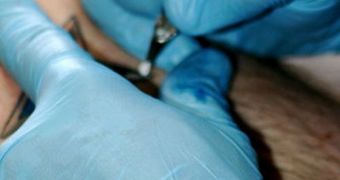Any self-respecting tattoo artist will ask his or her customer twice before starting to work on their skin. Given the difficulties associated with removing the ink from under the skin, and the fact that it’s tremendously expensive to do so, people need to make sure that they are always 100 percent convinced they want to go through with it. A new investigation has recently determined that this is almost never the case, especially in the case of teens. Many young adults want to get tattoos, but almost always fail to consider the long-term implications that these art forms imply, PhysOrg reports.
According to the paper, which appears in the latest online issue of the respected scientific Journal of Adolescent Health, less than half of teens who want to get a tattoo know about the risks and difficulties associated with getting them removed. The investigation was conducted on more than 4,200 secondary school students, all of which were asked if they were familiar with what removing tattoos implied. The respondents, aged 14 to 22, were selected because this age group is the most likely to be influenced by seeing tattoos on others, and then wanting one or more as well. Very often, getting ink at this age results in regrets later on.
The investigation revealed that only 40 percent of all these teens and young adults had any idea how difficult it is to remove tattoos. “Health education should emphasize that removing a tattoo is costly, painful and not always esthetically satisfying,” explains University of Padua Department of Environmental Medicine and Public Health professor, Luca Cegolon, MD. Almost all who knew the risks were part of the group that really wanted to have a tattoo done on them. This subgroup was on average better informed than the general study sample, but they still lacked advanced knowledge on the subject. Some 6 percent of teens in the study sample already had tattoos.
“Health education should be proactive, not reactive. Adolescents, particularly males, need to be told about the consequences of body modification before it is already done. Health education should involve the father, who appears to be influential in respect to decisions about body art,” adds Cegolon. In the case of the United States, similar studies have shown that more young adults are aware of the risk associated with tattoo removal, but statistics show that, in this country, more than 25 percent of youngsters have already had body modifications done.

 14 DAY TRIAL //
14 DAY TRIAL //